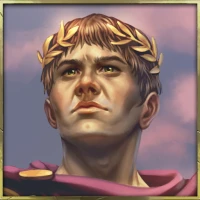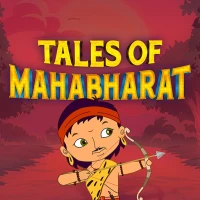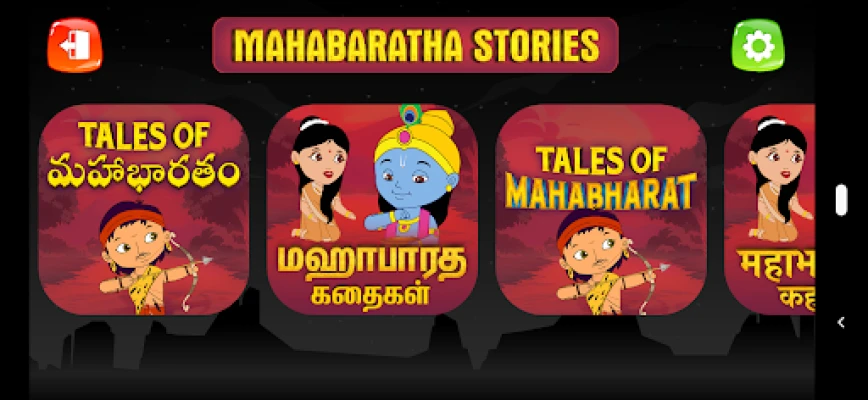
Latest Version
2.6
July 03, 2025
Magicbox Apps
Entertainment
Android
0
Free
com.magicbox.mahabharatha2018
Report a Problem
More About Mahabharatha Stories
Exploring the Legends: Ekalavya, Karna, Pashupathastra, Akshayapatra, and Yaksha Prasana
The rich tapestry of Indian mythology is woven with tales of valor, wisdom, and moral dilemmas. Among these, five remarkable characters stand out: Ekalavya, Karna, Pashupathastra, Akshayapatra, and Yaksha Prasana. Each of these figures embodies essential virtues such as determination, humility, patience, obeisance, and profound knowledge of the Vedas. This article delves into their stories, highlighting the lessons they impart and their significance in the grand narrative of the Mahabharata.
Ekalavya: The Indomitable Nishadha Warrior Prince
Ekalavya, a prince of the Nishadha tribe, is a symbol of unwavering determination and dedication. His story begins with a burning desire to learn archery from the great guru Drona. However, being of a lower caste, he faces rejection. Undeterred, Ekalavya constructs a statue of Drona and practices diligently in its presence. His commitment to mastering archery is so profound that he becomes an exceptional archer, rivaling even the best.
When Drona learns of Ekalavya's prowess, he demands a thumb as guru dakshina (a teacher's fee), effectively crippling Ekalavya's ability to shoot arrows. This act, while harsh, underscores the themes of sacrifice and the price of ambition. Ekalavya's story teaches us that true dedication often comes with significant challenges, and the pursuit of excellence requires resilience.
Karna: The Royal Essence of Sutaputra
Karna, born to the unwed princess Kunti and the sun god Surya, embodies the essence of nobility and loyalty. Despite his royal lineage, he faces societal rejection due to his status as a charioteer's son. This stigma does not deter him; instead, it fuels his ambition to prove his worth. Karna's unwavering loyalty to Duryodhana, the Kaurava prince, showcases his commitment to friendship and honor, even when it leads him down a path of conflict.
His life is a poignant reminder of the complexities of identity and the struggle against societal norms. Karna's character illustrates that one's worth is not defined by birth but by actions and choices. His tragic fate evokes empathy, making him one of the most relatable figures in the Mahabharata.
Pashupathastra: Arjuna's Divine Penance for Peace
The Pashupathastra, a celestial weapon bestowed upon Arjuna by Lord Shiva, symbolizes the culmination of penance and divine favor. Arjuna's quest for this powerful weapon is not merely for personal gain; it represents his commitment to righteousness and the protection of dharma (moral order). His rigorous penance, which includes fasting and meditation, reflects the virtues of patience and devotion.
This divine weapon plays a crucial role in the Kurukshetra War, where Arjuna must navigate the moral complexities of battle. The Pashupathastra serves as a reminder that true strength lies not only in physical prowess but also in the purity of intent and the pursuit of justice. Arjuna's journey emphasizes the importance of spiritual growth and the responsibilities that come with great power.
Akshayapatra: Surya's Gift to the Pandavas' Struggle
The Akshayapatra, a magical vessel gifted by the sun god Surya, symbolizes abundance and sustenance. This divine artifact provides the Pandavas with an endless supply of food, ensuring their survival during their years of exile. The Akshayapatra represents the themes of generosity and divine intervention in times of hardship.
Its significance extends beyond mere sustenance; it embodies the idea that faith and righteousness attract divine blessings. The Pandavas' reliance on the Akshayapatra during their struggles highlights the importance of community and support in overcoming adversity. This tale teaches us that even in the darkest times, hope and sustenance can come from unexpected sources.
Yaksha Prasana: Lord Yama's Test of the Pandavas
The Yaksha Prasana, or the riddle of the Yaksha, presents a profound moral and philosophical challenge to the Pandavas during their exile. When they encounter a mystical Yaksha who guards a lake, they must answer his riddles to quench their thirst. This encounter, orchestrated by Lord Yama, serves as a test of wisdom, knowledge, and ethical values.
The riddles posed by the Yaksha delve into the essence of life, death, and the nature of existence. Yudhishthira, the eldest Pandava, exemplifies wisdom and humility as he answers the riddles correctly, showcasing the importance of knowledge and moral integrity. This episode emphasizes that true strength lies not only in physical might but also in intellectual and ethical fortitude.
Conclusion: The Timeless Lessons of Determination, Humility, and Knowledge
The stories of Ekalavya, Karna, Pashupathastra, Akshayapatra, and Yaksha Prasana resonate with timeless lessons that transcend generations. Each character embodies virtues that are essential for personal growth and societal harmony. Their narratives remind us that determination, humility, patience, obeisance, and knowledge are the cornerstones of a meaningful life.
As we reflect on these legends, we are encouraged to embrace these values in our own lives, striving for excellence while remaining grounded in humility and wisdom. The Mahabharata, through these characters, continues to inspire and guide us on our journey through the complexities of life.
Rate the App
User Reviews
Popular Apps










Editor's Choice




























